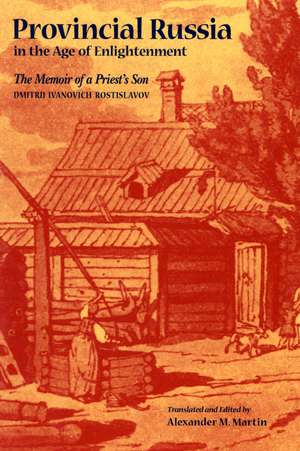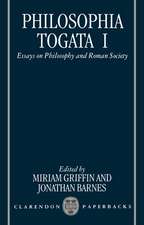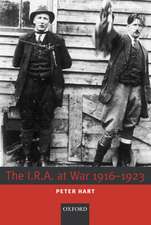Provincial Russia in the Age of Enlightenment – The Memoir of a Priest`s Son: NIU Series in Slavic, East European, and Eurasian Studies
Autor Dmitrii Ivanovi Rostislavov, Alexander Martin, Alexander M. Martinen Limba Engleză Paperback – 28 feb 2002
The memoir of Dmitrii Ivanovich Rostislavov—a mathematician, teacher, and social critic—offers a rare firsthand view of provincial Russia in the late eighteenth and early nineteenth centuries. Translated into English for the first time, these extraordinary observations reveal much about daily village life and the cultural milieu of the time. An acute observer, Rostislavov discusses social and ethnic relationships as well as matters pertaining to education, law enforcement, religious practice, and folk beliefs.
Rostislavov's account of his own education is a harrowing description of coming of age in a Darwinian world of violence and cruelty. Coarse, impoverished schoolboys, brutal and corrupt teachers, and callous landlords formed a harsh environment characterized by sadistic corporal punishment and bitter class hatreds. Variously humorous, elegiac, and passionate, his narrative shows why even those from relatively privileged backgrounds came to detest the authoritarian order of the old regime.
In a probing analysis of the Russian national order, Rostislavov found the twin evils facing Russia to be the coarseness of traditional society and the authoritarianism and corruption of the regime and its representatives. Russia's hope for the future, he believed, lay with cultural changes that would ultimately raise the society's moral level. Illustrations, maps, and an introduction illuminating the historical context accompany this remarkable account of life in provincial Russia.
Rostislavov's account of his own education is a harrowing description of coming of age in a Darwinian world of violence and cruelty. Coarse, impoverished schoolboys, brutal and corrupt teachers, and callous landlords formed a harsh environment characterized by sadistic corporal punishment and bitter class hatreds. Variously humorous, elegiac, and passionate, his narrative shows why even those from relatively privileged backgrounds came to detest the authoritarian order of the old regime.
In a probing analysis of the Russian national order, Rostislavov found the twin evils facing Russia to be the coarseness of traditional society and the authoritarianism and corruption of the regime and its representatives. Russia's hope for the future, he believed, lay with cultural changes that would ultimately raise the society's moral level. Illustrations, maps, and an introduction illuminating the historical context accompany this remarkable account of life in provincial Russia.
Din seria NIU Series in Slavic, East European, and Eurasian Studies
-
 Preț: 231.54 lei
Preț: 231.54 lei -
 Preț: 132.21 lei
Preț: 132.21 lei -
 Preț: 185.85 lei
Preț: 185.85 lei -
 Preț: 146.62 lei
Preț: 146.62 lei -
 Preț: 127.67 lei
Preț: 127.67 lei -
 Preț: 214.62 lei
Preț: 214.62 lei -
 Preț: 223.69 lei
Preț: 223.69 lei -
 Preț: 285.23 lei
Preț: 285.23 lei -
 Preț: 123.98 lei
Preț: 123.98 lei -
 Preț: 351.48 lei
Preț: 351.48 lei -
 Preț: 216.00 lei
Preț: 216.00 lei -
 Preț: 186.06 lei
Preț: 186.06 lei -
 Preț: 180.54 lei
Preț: 180.54 lei -
 Preț: 185.24 lei
Preț: 185.24 lei -
 Preț: 132.21 lei
Preț: 132.21 lei -
 Preț: 96.48 lei
Preț: 96.48 lei -
 Preț: 105.57 lei
Preț: 105.57 lei -
 Preț: 255.61 lei
Preț: 255.61 lei -
 Preț: 191.44 lei
Preț: 191.44 lei -
 Preț: 209.98 lei
Preț: 209.98 lei -
 Preț: 170.92 lei
Preț: 170.92 lei -
 Preț: 114.79 lei
Preț: 114.79 lei -
 Preț: 232.62 lei
Preț: 232.62 lei -
 Preț: 110.76 lei
Preț: 110.76 lei -
 Preț: 179.03 lei
Preț: 179.03 lei -
 Preț: 215.93 lei
Preț: 215.93 lei -
 Preț: 213.02 lei
Preț: 213.02 lei -
 Preț: 177.43 lei
Preț: 177.43 lei -
 Preț: 169.95 lei
Preț: 169.95 lei -
 Preț: 255.54 lei
Preț: 255.54 lei -
 Preț: 153.81 lei
Preț: 153.81 lei -
 Preț: 275.67 lei
Preț: 275.67 lei -
 Preț: 134.19 lei
Preț: 134.19 lei -
 Preț: 195.25 lei
Preț: 195.25 lei -
 Preț: 199.77 lei
Preț: 199.77 lei -
 Preț: 185.81 lei
Preț: 185.81 lei -
 Preț: 127.61 lei
Preț: 127.61 lei -
 Preț: 194.40 lei
Preț: 194.40 lei -
 Preț: 148.96 lei
Preț: 148.96 lei -
 Preț: 178.19 lei
Preț: 178.19 lei -
 Preț: 87.10 lei
Preț: 87.10 lei -
 Preț: 270.18 lei
Preț: 270.18 lei -
 Preț: 162.54 lei
Preț: 162.54 lei - 18%
 Preț: 214.39 lei
Preț: 214.39 lei -
 Preț: 126.95 lei
Preț: 126.95 lei -
 Preț: 184.57 lei
Preț: 184.57 lei
Preț: 250.62 lei
Nou
Puncte Express: 376
Preț estimativ în valută:
47.97€ • 49.99$ • 39.93£
47.97€ • 49.99$ • 39.93£
Carte tipărită la comandă
Livrare economică 07-21 ianuarie 25
Preluare comenzi: 021 569.72.76
Specificații
ISBN-13: 9780875805924
ISBN-10: 0875805922
Pagini: 279
Dimensiuni: 153 x 228 x 23 mm
Greutate: 0.53 kg
Ediția:1
Editura: MB – Cornell University Press
Seria NIU Series in Slavic, East European, and Eurasian Studies
ISBN-10: 0875805922
Pagini: 279
Dimensiuni: 153 x 228 x 23 mm
Greutate: 0.53 kg
Ediția:1
Editura: MB – Cornell University Press
Seria NIU Series in Slavic, East European, and Eurasian Studies
Recenzii
"An expert translation of an important source."
—Gregory L. Freeze, Brandeis University
"Riveting and highly readable. Rostislavov provides a unique view of life in prereform Russia."—Christine D. Worobec, author of Peasant Russia and Possessed
—Gregory L. Freeze, Brandeis University
"Riveting and highly readable. Rostislavov provides a unique view of life in prereform Russia."—Christine D. Worobec, author of Peasant Russia and Possessed
Notă biografică
Alexander M. Martin, author of Romantics, Reformers, Reactionaries: Russian Conservative Thought and Politics in the Reign of Alexander I, is Associate Professor of Modern European History at Oglethorpe University. He lives in Atlanta with his wife and two children.
Cuprins
Table of Contents List of Illustrations
Acknowledgements
Translator's Introduction
Preface: My Goals and Intentions in Writing My Memoir
1. My Family Background
2. The Village of Palishchi and Its Environs
3. A Village Household
4. Corporal Punishment at Home
5. My Early Education
6. My Family Moves to Tuma
7. Outlaws and Law Enforcement
8. Our Home Life in Tuma
9. Hospitality
10. Household Work
11. Agricultural Work
12. Community Life in Tuma
13. How the Clergy Would Tour the Parish
14. The Kasimov Church School
15. The Church-School Students
16. My Life in Kasimov
17. Society in Kasimov
18. The Tatars of Kasimov
19. Governor-General Balashov
20. The Merchant Riumin
21. The Death of the Tsar
Endnotes
Bibliography
Index
Acknowledgements
Translator's Introduction
Preface: My Goals and Intentions in Writing My Memoir
1. My Family Background
2. The Village of Palishchi and Its Environs
3. A Village Household
4. Corporal Punishment at Home
5. My Early Education
6. My Family Moves to Tuma
7. Outlaws and Law Enforcement
8. Our Home Life in Tuma
9. Hospitality
10. Household Work
11. Agricultural Work
12. Community Life in Tuma
13. How the Clergy Would Tour the Parish
14. The Kasimov Church School
15. The Church-School Students
16. My Life in Kasimov
17. Society in Kasimov
18. The Tatars of Kasimov
19. Governor-General Balashov
20. The Merchant Riumin
21. The Death of the Tsar
Endnotes
Bibliography
Index
Descriere
The memoir of Dmitrii Ivanovich Rostislavov—a mathematician, teacher, and social critic—offers a rare firsthand view of provincial Russia in the late eighteenth and early nineteenth centuries. Translated into English for the first time, these extraordinary observations reveal much about daily village life and the cultural milieu of the time. An acute observer, Rostislavov discusses social and ethnic relationships as well as matters pertaining to education, law enforcement, religious practice, and folk beliefs.
Rostislavov's account of his own education is a harrowing description of coming of age in a Darwinian world of violence and cruelty. Coarse, impoverished schoolboys, brutal and corrupt teachers, and callous landlords formed a harsh environment characterized by sadistic corporal punishment and bitter class hatreds. Variously humorous, elegiac, and passionate, his narrative shows why even those from relatively privileged backgrounds came to detest the authoritarian order of the old regime.
In a probing analysis of the Russian national order, Rostislavov found the twin evils facing Russia to be the coarseness of traditional society and the authoritarianism and corruption of the regime and its representatives. Russia's hope for the future, he believed, lay with cultural changes that would ultimately raise the society's moral level. Illustrations, maps, and an introduction illuminating the historical context accompany this remarkable account of life in provincial Russia.
Rostislavov's account of his own education is a harrowing description of coming of age in a Darwinian world of violence and cruelty. Coarse, impoverished schoolboys, brutal and corrupt teachers, and callous landlords formed a harsh environment characterized by sadistic corporal punishment and bitter class hatreds. Variously humorous, elegiac, and passionate, his narrative shows why even those from relatively privileged backgrounds came to detest the authoritarian order of the old regime.
In a probing analysis of the Russian national order, Rostislavov found the twin evils facing Russia to be the coarseness of traditional society and the authoritarianism and corruption of the regime and its representatives. Russia's hope for the future, he believed, lay with cultural changes that would ultimately raise the society's moral level. Illustrations, maps, and an introduction illuminating the historical context accompany this remarkable account of life in provincial Russia.













